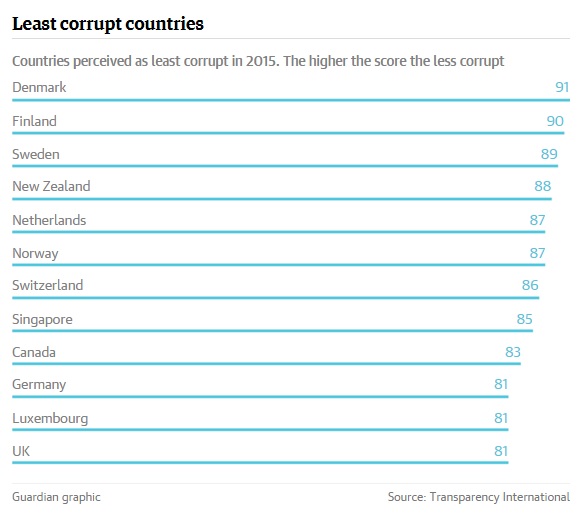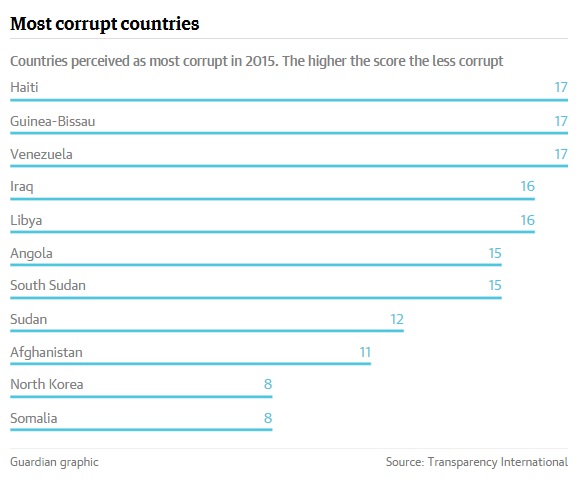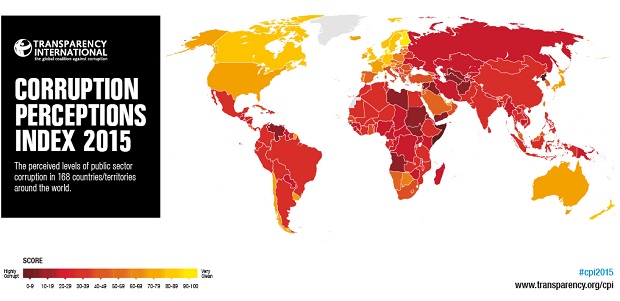News
Billions locked in poverty by public sector corruption, report shows

2015 index of perceived corruption, which ranked Somalia as the worst offender, says more than 6 billion people live in countries where corruption is rife
More than 6 billion people live in countries where serious levels of public sector corruption are fuelling inequality and exploitation and locking millions of men, women and children into poverty, according to the annual index of perceived corruption.
Transparency International’s Corruption Perceptions Index 2015 – which ranked 168 countries on a scale of 0 (highly corrupt) to 100 (very clean) – is once again topped by Denmark, which scored 91. Close behind are Finland (90), Sweden (89), New Zealand (88) and the Netherlands (87).
Germany, Luxembourg and the UK are equal 10th with a score of 81, while the US comes in 16th on 76. The five countries at the bottom are: Somalia (8); North Korea (8); Afghanistan(11); Sudan (12), and South Sudan (15).

Although the report finds that two-thirds of all the countries rated have a serious corruption problem – judged to be a score of less than 50 – and acknowledges that corruption remains rife, Transparency International said there were grounds for optimism as more countries had improved their scores than seen them decline since the previous index.
It pointed to Guatemala, Ghana and Sri Lanka as countries where progress has been made. The Central American nation was praised for its crackdown on corruption in September after former president Otto Pérez Molina was ordered to stand trial for corruption, illicit association and bribery linked to a multimillion-dollar customs scam.

In Ghana, the investigative journalist Anas Aremeyaw Anas and a team of reporters revealed a bribery scandal at the heart of the judiciary, while in Sri Lanka, corruption became a key issue in the presidential election last year.
Among the countries that have seen the biggest declines over the past four years are Australia, Brazil and Turkey. Australia, which came 13th with a score of 79, was 11th last year, on 80 points. In 2012 , it scored 85. The country has been beset by major corruption scandals involving state-run companies in recent years, leading Transparency International to call on the government to tackle the weaknesses in its laws that are undermining efforts to deal with the issue.
Brazil – which is still convulsed by the corruption scandal surrounding its biggest oil company, Petrobras – has fallen from 69th (43) to 76th (38) over the past year.
The NGO said Turkey’s “very visible trend towards less separation of powers [and] decreasing civil liberties – especially freedom of speech and freedom of press” had combined with accusations of high-level corruption to see it drop from 64th (45) in 2014 to 66th (42) a year later.
The index is based on data from organisations including the World Bank, the Economist Intelligence Unit and the World Economic Forum
According to Transparency International, high-scoring countries typically have good levels of press freedom, transparent and accessible budget information, independent and fair judiciaries, and “high levels of integrity among people in power”.
The opposite is true for countries at the other end of the scale, which are also often afflicted by conflict, poor governance and prevalent bribery.
Despite the overall picture – and the fact that 53% of G20 countries scored less than 50 – Transparency International said the triumphs of 2015 showed that corruption could be tackled if people worked together.
“To stamp out the abuse of power, bribery and shed light on secret deals, citizens must together tell their governments they have had enough,” said its chair, José Ugaz.
“The index clearly shows that corruption remains a blight around the world. But 2015 was also a year when people again took to the streets to protest corruption. People across the globe sent a strong signal to those in power: it is time to tackle grand corruption.”





